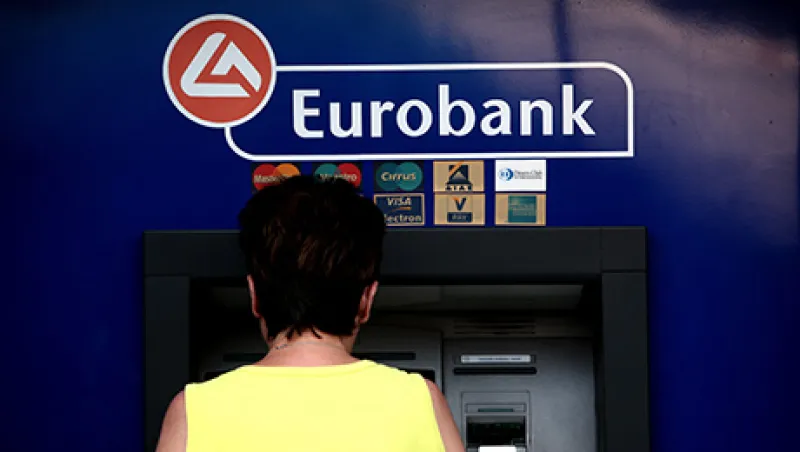“Good fortune is a god among men,” Aeschylus wrote some 2,500 years ago. The Greek playwright’s maxim is one that Christos Megalou, chief executive of Eurobank Group, readily embraces.
When he took over Greece’s fourth-largest lender a year ago, the country was in the trough of a recession that has shrunk the economy by more than 25 percent since the global financial crisis erupted in 2008. The crisis hit Eurobank the hardest of the Big Four banks. Although Piraeus Bank, Alpha Bank and National Bank of Greece (NBG) all fell under state ownership, the government took its biggest stake — almost 95 percent — in Eurobank.
Yet by April this year, Eurobank became the first Greek bank to return to majority private ownership. Investors, spearheaded by the Los Angeles–based investment manager Capital Group, Toronto-based Fairfax Financial Holdings and New York–based distressed debt specialist WL Ross & Co., took a 65 percent share and pumped €2.9 billion ($4.0 billion) into Eurobank, one of the largest capital raisings in Greek history. It will take local rivals at least two years to regain majority private sector ownership, even though they entered the crisis with stronger capital bases than did Eurobank and followed more closely the recovery road map laid out by financial authorities.
So, how did Eurobank pull it off? “There’s no question that luck played its part,” Megalou says in an interview at Eurobank headquarters in Athens. His terrace offers a stunning view of the Acropolis, the slope of which Aeschylus used to stage his plays.
Some of that luck was shared by all the Big Four banks. Investors fleeing emerging markets have poured €8.5 billion of equity into these financial institutions so far this year as it became clear that Greece would remain in the euro zone and that the banking sector’s reforms were starting to take hold.
But its own past miscues also allowed Eurobank to bolt ahead of its peers. In April 2013 the bank’s proposed merger with NBG was nixed by the so-called Troika — the European Commission, the European Central Bank and the International Monetary Fund — which set the terms of Greece’s bailout. The Troika thought the merger would create a bank too large to fail.
Eurobank then missed the July 2013 deadline set by the Greek regulator and the Troika for Greek banks to raise 10 percent of their recapitalization needs from the private sector. Eurobank asserted it did not have enough time to raise the funds after its failed merger attempt. Instead, Eurobank covered virtually all of its capital needs with a bailout from the Hellenic Financial Stability Fund, the public agency created in 2010 to oversee banking recovery. This has led to lingering resentment in the industry. “It must be pointed out that NBG achieved the 10 percent private sector investment under the same extreme circumstances,” says Anastasia Sakellariou, the HFSF chief executive.
HFSF holds its stakes in Piraeus, Alpha and NBG in warrants that the agency must retain until summer 2016, effectively preventing any earlier return by those banks to majority private ownership. Since the agency did not hold warrants in Eurobank, its journey back to private hands was swifter. “We weren’t comfortable with warrants,” says Wilbur Ross, the WL Ross founder who first looked at Piraeus and Alpha before choosing to invest €37.5 million in Eurobank. “Warrants are attractive to hedge funds who can do all sorts of derivative things with them. But we aren’t traders. We’re long-term investors.”
Beyond sheer luck, Eurobank has benefitted from solid management under Megalou. “He’s done a phenomenal job in turning around morale at the bank,” says Jason Manolopoulos, managing partner and co-founder at Dromeus Capital Group, a Greece-focused hedge fund firm with holdings in Eurobank. The tall, ebullient Megalou, now 55, spent 17 years at Credit Suisse, rising to vice chairman of investment banking for Southern Europe. His appointment in June 2013 as Eurobank’s CEO was his first experience in commercial banking. “If you’re under pressure, you just have to deliver,” says Megalou.
He began by cutting costs, mainly through an early-retirement scheme that saw the departure of 1,072 employees, or 12 percent of the staff. He promised the remaining employees that once Eurobank returns to profitability, their performance-linked incomes would rise faster than at other banks, which as state-controlled institutions remain under tighter salary constraints.
Besides cost cutting, Megalou expects higher net interest margins to drive profitability. Pushed by the Troika, consolidation has reduced the commercial banking sector from 18 institutions in 2009 to only six today. With far less competition, the Big Four banks, which account for 90 percent of credit, can charge higher interest rates on loans and lower rates on deposits. Megalou predicts that Eurobank’s current net interest margin of 1.93 percent will rise to at least 2.5 percent by 2015.
The biggest new lending will come in high-end tourism. In April this year Eurobank helped finance a luxury resort in the northern Greece resort town of Halkidiki that will be run as a joint venture between Los Angeles–based Oaktree Capital Group and Greek hotel owner Sani. (Terms weren’t disclosed.) The two partners plan to develop as many as five other resorts, and Eurobank hopes to extend loans to those projects as well.
Megalou is also hoping that 2014 will be the last full year of losses at his bank. It racked up €1.15 billion in red ink last year on assets of €77.6 billion, compared with a loss of €1.46 billion in 2012, when the bank had assets of €67.7 billion. The biggest problem is nonperforming loans, which total 31 percent of the €52.4 billion portfolio. “We are expecting a return to profitability in 2015,” says the chief executive.
Because of regulatory constraints on all banks, Eurobank won’t be paying dividends until 2017 or 2018. That’s still a lot sooner than Aeschylus advised the ancient Greeks to wait for financial satisfaction. “Only when man’s life comes to its end in prosperity can one call that man happy,” wrote the playwright.
Get more on banking.






